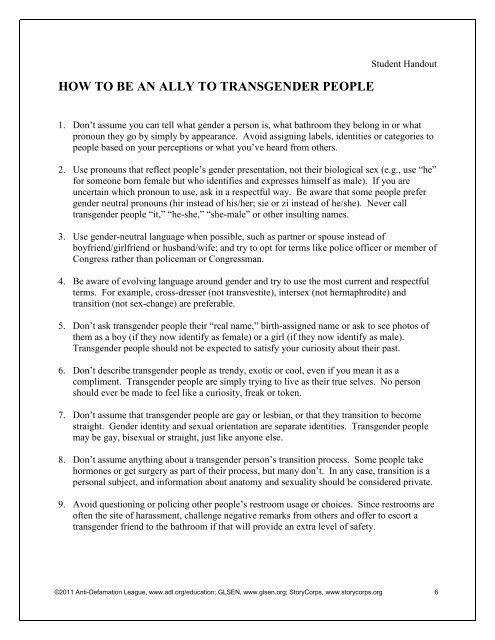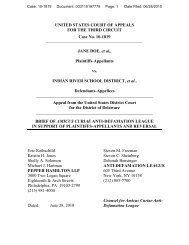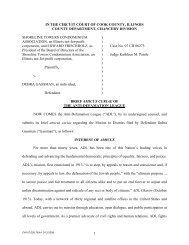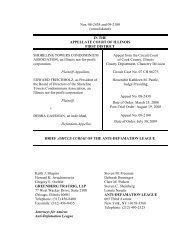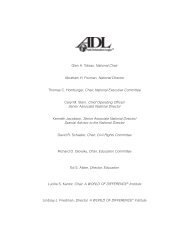HIR By Alysia Harris And Aysha El Shamayleh - Anti-Defamation ...
HIR By Alysia Harris And Aysha El Shamayleh - Anti-Defamation ...
HIR By Alysia Harris And Aysha El Shamayleh - Anti-Defamation ...
Create successful ePaper yourself
Turn your PDF publications into a flip-book with our unique Google optimized e-Paper software.
HOW TO BE AN ALLY TO TRANSGENDER PEOPLE<br />
Student Handout<br />
1. Don’t assume you can tell what gender a person is, what bathroom they belong in or what<br />
pronoun they go by simply by appearance. Avoid assigning labels, identities or categories to<br />
people based on your perceptions or what you’ve heard from others.<br />
2. Use pronouns that reflect people’s gender presentation, not their biological sex (e.g., use “he”<br />
for someone born female but who identifies and expresses himself as male). If you are<br />
uncertain which pronoun to use, ask in a respectful way. Be aware that some people prefer<br />
gender neutral pronouns (hir instead of his/her; sie or zi instead of he/she). Never call<br />
transgender people “it,” “he-she,” “she-male” or other insulting names.<br />
3. Use gender-neutral language when possible, such as partner or spouse instead of<br />
boyfriend/girlfriend or husband/wife; and try to opt for terms like police officer or member of<br />
Congress rather than policeman or Congressman.<br />
4. Be aware of evolving language around gender and try to use the most current and respectful<br />
terms. For example, cross-dresser (not transvestite), intersex (not hermaphrodite) and<br />
transition (not sex-change) are preferable.<br />
5. Don’t ask transgender people their “real name,” birth-assigned name or ask to see photos of<br />
them as a boy (if they now identify as female) or a girl (if they now identify as male).<br />
Transgender people should not be expected to satisfy your curiosity about their past.<br />
6. Don’t describe transgender people as trendy, exotic or cool, even if you mean it as a<br />
compliment. Transgender people are simply trying to live as their true selves. No person<br />
should ever be made to feel like a curiosity, freak or token.<br />
7. Don’t assume that transgender people are gay or lesbian, or that they transition to become<br />
straight. Gender identity and sexual orientation are separate identities. Transgender people<br />
may be gay, bisexual or straight, just like anyone else.<br />
8. Don’t assume anything about a transgender person’s transition process. Some people take<br />
hormones or get surgery as part of their process, but many don’t. In any case, transition is a<br />
personal subject, and information about anatomy and sexuality should be considered private.<br />
9. Avoid questioning or policing other people’s restroom usage or choices. Since restrooms are<br />
often the site of harassment, challenge negative remarks from others and offer to escort a<br />
transgender friend to the bathroom if that will provide an extra level of safety.<br />
©2011 <strong>Anti</strong>-<strong>Defamation</strong> League, www.adl.org/education; GLSEN, www.glsen.org; StoryCorps, www.storycorps.org 6


